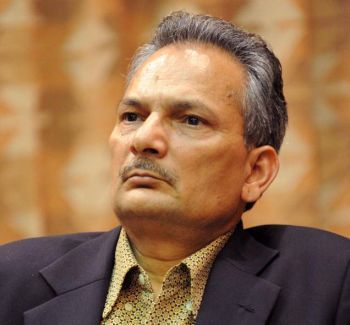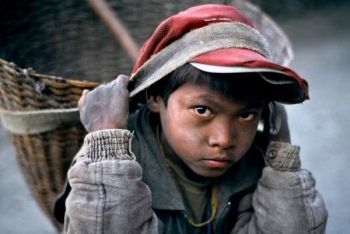
Publisher:
Bonnie King
CONTACT:
Newsroom@Salem-news.com
Advertising:
Adsales@Salem-news.com

~Truth~
~Justice~
~Peace~
TJP
Feb-29-2012 14:23

 TweetFollow @OregonNews
TweetFollow @OregonNews
Nepal: Play an Important Role to Protect Child Rights
Salem-News.comSalem-News.com Eye on the World Report.
 Dr. Baburam Bhattarai, Prime Minister of Nepal |
(SAYDABAD, Bangladesh) - Nepal became part of the Convention on the Rights of the Child in 1990, ratifying the Optional Protocol to the Convention on the Rights of the Child on the Sale of Children, Child Prostitution and Child Pornography in 2006 and the Optional Protocol to the Convention on the Rights of the Child on the Involvement of Children in Armed Conflict in 2007.
 Child Labour in Nepal |
It is time to ratify the third Optional Protocol to the Convention on the Right of the Child on a communications procedures, adopted on 19 December 2011 by the General Assembly in its resolution 66/138. The signing ceremony is scheduled for 28 February 2012 in Geneva, Switzerland and thereafter at United Nations Headquarters in New York.
Our goal with Eye on the World is to illustrate and highlight politically oriented problems and tragedies that traditional media channels don't have time or interest in covering.
The world has its own set of laws that were agreed upon by the ruling nations in 1948, and many people are not aware of this simple fact. At the root of the concept of world citizenry itself, is the United Nations Universal Declaration of Human Rights, an overriding and supreme law that ensures many essential human rights that governments today fail to observe. Also central to any hope of human success, is the understanding of the human hierarchy of needs, as defined by Abraham Maslow- more information on this at the conclusion of this entry. We must use the Internet as a tool of justice at every junction, and we need to assist all human beings, everywhere, and not allow cultural, racial or religious preferences as determiners.
In this appeal, William Gomes calls on Dr. Baburam Bhattarai, the Prime Minister of Nepal in Kathmandu, to show leadership on this issue, becoming a party to the new Optional Protocol. He believes the Nepal government should reassert its commitment to respect and protect child rights and to fulfill obligations accepted when it became a party to the CRC. Gomes reminds Dr. Baburam Bhattarai, that it is an opportunity for Nepal to play an important role at the forefront of efforts to protect child rights in South Asia.
February 28, 2012
Dr. Baburam Bhattarai
Prime Minister of Nepal
Office of the Prime Minister and Council of Nepal
Singh Durbar
P.O. Box: 43312
Kathmandu
Nepal
Fax: +977 1 4211 086
Email: info@opmcm.gov.np,bhattaraibab
Re: Nepal: Play an important role to protect child rights
Dear Prime Minister,
I share your hopes for a peaceful, democratic future for Nepal and its people.
Nepal has been a State Party to Convention on the Rights of the Child (CRC) since 1990, I want to take this opportunity to call on you to ratify the third Optional Protocol to the Convention on the Right of the Child on a communications procedures, adopted on 19 December 2011 by the General Assembly in its resolution 66/138. The signing ceremony is scheduled for 28 February 2012 in Geneva, Switzerland and thereafter at United Nations Headquarters in New York.
This new Optional Protocol will enable children, or their representatives, who claim that their rights have been violated, to bring a complaint to the UN Committee on the Rights of the Child, in cases where domestic remedies have been exhausted. This procedure recognizes the rights of the child as forming an integral part of the human rights framework. It will be the only complaint mechanism covering the full range of rights guaranteed under the CRC and should significantly contribute to empower victims whose rights have been violated under the CRC in seeking remedies.
Since joining the United Nations in 1955, Nepal has made being an active member of the UN a key pillar of its foreign policy. In addition, Nepal has further shown its commitment to the rights of the child by ratifying the Optional Protocol to the Convention on the Rights of the Child on the Sale of Children, Child Prostitution and Child Pornography in 2006 and the Optional Protocol to the Convention on the Rights of the Child on the Involvement of Children in Armed Conflict in 2007. The ratification of the third Optional Protocol to the CRC would further enhance the image of Nepal as a positive player in the international community. It would also send an important message to the world that Nepal is fully committed to the protection and promotion of child rights both at home and internationally.
The new Optional Protocol does not impose new substantive obligations on the government of Nepal, but assists it in fulfilling its obligations under the CRC. I believe that the speedy ratification of the Optional Protocol should be possible as a result of this. On the occasion of its Universal Periodic Review, Nepal accepted recommendations by numerous States, including Egypt, the Philippines, Azerbaijan and Cuba concerning the need to strengthen measures protecting child rights, notably through the development of a robust juvenile justice system. The communication procedure established by the Optional Protocol would assist Nepal in upholding these commitments. It complements the government reporting to the CRC and, as the Optional Protocol takes effect where the local remedies have failed or are non-existent, will encourage State Parties to develop such domestic remedies and mechanisms for the promotion and protection of child rights and in order to provide effective remedies.
Nepal was highly praised by the international community on her ratification of the Optional Protocol to the Convention on the Rights of the Child on the involvement of children in armed conflict in year January 3, 2007. This important treaty, which has been ratified by 113 other states worldwide, establishes the age of 18 as a minimum for any direct participation in hostilities or for compulsory recruitment or any recruitment by non-state armed forces.
I call on you to show leadership on this issue, becoming a party to the new Optional Protocol. Your government would reassert its commitment to respect and protect the child rights and to fulfill the obligations it accepted when it became a party to the CRC. Furthermore, this represents an opportunity for Nepal to play an important role at the forefront of efforts to protect child rights in South Asia.
Sincerely yours,
William Nicholas Gomes
William’s Desk
Download: Nepal-Play an important role to protect child rights
http://www.williamgomes.org/?
Maslow's hierarchy of needs
As children we are educated in right and wrong, we are told how to conduct ourselves; we learn both expectations and limitations, and from that point we go forth with these tools, and our individual personalities, and fail or succeed accordingly.
In school we quickly understand that without paper, there is no place to write. Once we have paper, a pen or pencil is required to move to the next point. There is a great analogy that exists between this simple concept of paper and pen, and what we know today as Maslow's hierarchy of needs- the theory in psychology proposed in Abraham Maslow's 1943 paper A Theory of Human Motivation.
He demonstrated how without the correct necessities, a person can do little good for themselves, and has none to offer for others. However when people are housed and have clothing, heat, food, health and security, anything is possible. However if just one of these dynamics is removed from the mix, the chance for success can be adversely affected.
Wikipedia describes Maslow's hierarchy of needs as a pyramid consisting of five levels:
The lowest level is associated with physiological needs, while the uppermost level is associated with self-actualization needs, particularly those related to identity and purpose.
The higher needs in this hierarchy only come into focus when the lower needs in the pyramid are met. Once an individual has moved upwards to the next level, needs in the lower level will no longer be prioritized. If a lower set of needs is no longer be met, the individual will temporarily re-prioritize those needs by focusing attention on the unfulfilled needs, but will not permanently regress to the lower level.
For instance, a businessman at the esteem level who is diagnosed with cancer will spend a great deal of time concentrating on his health (physiological needs), but will continue to value his work performance (esteem needs) and will likely return to work during periods of remission.
And finally, if you care about our efforts, please help us by sending a donation, we seriously need it as ad revenue is very limited, and we aren't doing this to make money. Your support allows our attention to remain with content which is vital. There is a PayPal logo at the top of Salem-News.com. Please help us fight the good fight.
Our PayPal email is bonjtheartists@hotmail.com
Special thanks to William's Desk
http://www.williamgomes.org/?
 |
 |
 |
 |
 |
Articles for February 28, 2012 | Articles for February 29, 2012 | Articles for March 1, 2012



googlec507860f6901db00.html

Salem-News.com:
Terms of Service | Privacy Policy
All comments and messages are approved by people and self promotional links or unacceptable comments are denied.
[Return to Top]
©2026 Salem-News.com. All opinions expressed in this article are those of the author and do not necessarily reflect those of Salem-News.com.